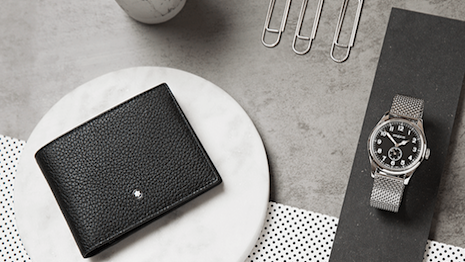While consumer demographics have become more diverse and customer needs are more varied, individuals' spending habits are largely in line with those seen a few decades ago.
According to a new report from Deloitte, many spending habits such as the amount allocated to dining and entertainment have not necessarily changed as much as the economic environment has changed. Understanding how diversity has bred diverging consumer demands and wants is crucial for luxury brands that want to stay competitive in a crowded market.
"Deloitte's findings debunked many conventional wisdoms about the new-age consumer," said Kasey Lobaugh, chief innovation officer of retail and distribution at Deloitte, Kansas City, MO. "In many ways, the consumer hasn't fundamentally changed.
"Instead, their behaviors have been triggered by a rise in non-discretionary expenses and the growing bifurcation between high and low income groups," he said.
Deloitte's findings are based on government data, primary interviews and a survey of more than 4,000 U.S. consumers.
Differing demographics
Four in 10 millennials belong to ethnic or racial minority groups, representing one of the biggest shifts in U.S. demographics in the last 50 years. Millennials as a whole account for 30 percent of the U.S. population.
While the population of Latino consumers is expected to grow in the U.S., Asian households have the highest annual median income at $81,000.

In the U.S., Asian households are seeing increased spending power. Image credit: Michael Kors
The income gap also continues to grow. From 2007 to 2017, income growth for those with mean household incomes of more than $100,000 increased more than 1,305 percent than households with average incomes of less than $50,000.
Notably, the net worth of consumers younger than 35 has declined by 34 percent since 1996. This has contributed to declining rates of homeownership among millennials as well.
Despite these economic realities, the retail market continues to expand.
Per Deloitte, this is due to population growth rather than increased spending from individual consumers. Since 2005, per capita retail spending has remained mostly flat.
From 1997 to 2017, the percentage spent on categories including food, dining, alcohol and home furnishings has also been relatively consistent.
During that same period, however, non-discretionary spending on housing, healthcare and education have taken a bigger portion of millennials' budgets.

Fewer millennials own homes as housing costs have increased. Image credit: Redfin
Deloitte's findings also show that experience-based spending, such as travel, hospitality and entertainment, is driven more by income than age.
While millennials as a whole may spend 3 percent more on experiences than baby boomers, consumers with annual incomes above $80,000 spend 11 percent more on experience-based categories than those who make less than $35,000.
Power of personalization?
Deloitte also examined the perception that young affluent consumers are increasingly drawn to retailers who emphasize core values and personalization.
However, the consumers surveyed, including high-income millennials, cited price and convenience – including product availability and accessibility – as the leading motivations for selecting retailers. Overall, less than 5 percent of respondents cited alignment with core values or personalized experiences.
These findings from Deloitte run counter to the strategies many luxury brands and retailers have embraced in recent years.
During the “Women in Luxury 2019: Empowered Affluence” conference on May 9, executives from different luxury sectors gave predictions on how luxury will evolve as experiences and personalization grow in importance.
Looking towards the future of luxury in their different sectors, the panelists agreed that privacy and personalization will continue to shape the relationships between brands and consumers. Even when consumers favor convenient services, such as online shopping, as a way to save time, these experiences are not always up to luxury standards in digital environments (see story).
Other research shows that Generation Z consumers, the successors to millennials, are likelier to appreciate core values than older consumers.
As social norms seem to be shifting and important social conversations are at a high, a study by DoSomething.org found that 76 percent of Gen Z consumers have purchased or are open to buying from a brand based on the issues it supports. Many are now even seeking out brands, rather than finding them by happenstance, based on social causes.
About half claim to have recently purchased an item based on an issue affiliation in an effort to take a stand. Another 40 percent say they would cease business with a brand based on how aligned it is with their personal values (see story).
{"ct":"3ZahOhg9iFhOK5o\/+LCB30Sl+9RxHVO9NEKZrU7YXIMDHhi6bnauIbmnnOXno8OOtWZnirKqkIkm1zYgM59dYBQul+kD0HmhzrgoIkfr3mXciSNGfs5KDwJ75wv68hRAv4x1gBfzB\/ynX6w7yDNEzXxcGmgjbZ+Uz9igxQ\/eKDuUOydFfvJs98Tmf6p7zfXVHSp6mox+9v3RgCKcNxVyzcA46QDk3yNGx5K3p8hPxyLlPsd5UkifMBnTxRoLtB5YBzT4MXkKUYrDNDen+\/iovvx56h2AUb+RRygPp4yEAaRpSfEKbHcyRS9qBoLoL12v3dMZBOjYqxD3Vh+d017eUzYE1FL7pnzqa+vsHxXybEbcJiG0HtN9VvXn1+muqWcmaywgbvsjaRmIvib5evL8dMiXLdwuJawpBQzTEWmT8DakqiwEZh841KuBCvwCkx\/HL1epaKshyQw2cLl7d+90D2beXzsxW960QD3PgNjE9DEaZhlt\/fm3IAQHNy9JPUf4AKzp6c1AeGseYXE+3Qbetm7wGbEa+KCkmWiteNkV8SFZ8g7HbPvgYhBD4tetfNlapMfpJiR3fKDLY2BT+eCtYPvDkfd+Vz5yf1KWMfLH4mOk9imEq9F8xrmwnX10WAF1k05I1UuVmBIv571h0ZIvXeMvrw4\/WjCVnAy0Lt89YFnUF0\/cRb8naWNDBjx3lOoJ+AqNMM\/mRn6jeBm9Hfu150v4nEzYGqVVW2f+S\/RJ4heTz7F85Klh0K\/7lyN8C0p88YBKAAQJmN0hEmGI0mpyprYBw4IcteaIAw9K1E9zR7eBbz62KOx1oAnK8Fub9EVanN6mJ3WYDiLKVVtjRS1vOfWpm4Ppn0MhwwIx8DJscrX7uJb4QRYAWUkUiBRwnzaChlPeqFiqaRmVev1UaHj9ueLPtGNZDyG\/zzxmy01itiw4Vr4RbfNbtHdJcE4uMILf62TKwkC+WgfddDMmdAY12BFId1WAnsyckSbdEGyv000l79+Yvv0tmpUmEn8UvA8g\/zclQbuilqUmly9\/W0aI0QzWly8eeoa\/w+r9WqMgW3dDBINtrxF50iMRYExCsjFfM4tb4LxFX5+riPcn+gkoGEzQ7VcAg4\/3IfRflUlPC3Rva95HXoXsbTHQvHPTZxJgn8tyL7DZysHzWhlTEMnZMF0r1h0p1yPWYX1dDDAcNXG\/Qo2F2I34RRdBFsJd189yG4i+1gFYxbsQuwe44G+NTWuPfRfrDJJMUKeFQOrqtB9xXYiPRjvjBfFE8WFN\/3SbM7xAaPptjiDYwLTLdB1qhxPJqkHskL\/ayRR6KloPnTuLhUgyK21DIs7B7IjWR4Ff4zEvflAxA5HLbNaEBNDCXg1Rq7AoZ78O8cbIEjk1JQ+JwH+wHVU+fJfEeQyO9aEu+x9+p7up7zirr0X6xWE6ncdTLOjB3PkErCR39nlWFRjDq8xRXsRrj2KZucTDKgy3fK8reNTAkN\/ztLHzuXQEVldw2XoGkhKjhEb0fYHYZQzheN7Uxa6Q0CkQFSRHlx5pnW4inBvARe+lPYKm1xyo1k9H\/d\/fV29eG9S4s4t+eTsLto9a1acv6+p0iDTRF8B66zC2iYdNzL6CAJ2mOwJlBTNd7PcHuS\/d+Mf3Aw79Mkb8D4mjy\/WIDPPydLqOp2Vf9E7Ey9gPuSsnO+fe7B7xUEvnzPEd+2wkIWfoYIpLs5ctz+Klm+tzfbUKGnhCto4aKpntPgB5xK\/PeA5rYraEKERkaZFDGU6xTzRtAGwZ2x9KdSTNJ+EgtAF+btSoXMGhJyGGIf3jjW2sqNiu+Jz\/47tp619HjYCABQaqGPBpWYGQ0ok5buGADdCx7BjEWBbkt9vOO\/okdktRCt55HTZC4ueZvD3gOZe5S8TwUQQN1bPY4\/X89MW7v8Rkq154y1bz2cbstoIo2fC1tTkVfKShoXtJKQgaJ5hZXkSNPCpnaAPrk0t\/7rtR1GgtUD3fUPAlampEYSuQLJJeYrIcJmBOge7q0rPhhQ93qoDqT49VE1Oque33ynxaSOYQbIuzjLIzEnfM9CVLjPtkQZ7R6c+2Jqu+NQtk\/TJuoCv6LVN4a3VlbGgrcK\/HGINs\/ZyhRVHbloRpss+nS+\/QIGQDX88mp6JD6lvcKATtdYhIlPCOIFHH7tbrONoucHKVLVnwgOjk77ZCJbly3xWUpnXtRtt4ON\/R+iAklNbCBDBoUwRmVykBSgUFxMjhGXIOBIvwsh02I\/2e6UeBRnFKydRMW6AL38t1+yCZL80LzTwMcHu1yoEGssoU8JLbe7fNZ9dJhWjYdMByLTknHVO4eDmBDf57FPXh3awFNLM0CHG6Xn2\/J\/lp9B2lOZKAPFcTZPEQ5s4JyqCB2bJM81TU7Fqlbf9qAhoRmyvmHi4gNqD6wgxUVNbaTg6f7Fvi4HDWx8n7mY85a18tv\/Z5aDVqarh2z\/CAv0xnpMrwShRD3NEjwzwCjhtsn6qzzcEXg1xGru9OUNW5KNsgO+EIFYFnYjK468kIaKUPq9RQ6p4+jGS6Z85wF+4FSAHvlM456aDy5IUUBO7WYZMw4iIA0+qKIMH3K3eSh4K\/Wfs+MrtW5VaSZjB8KscmepAwnQ5c3upPJPPHVxi+7OSBjt2EPz1OdDux2sHXhJNuLwQ8p96squs\/Z38re2e6fRRAO2o2L3awZjsZV1uGG+H+oEPA8Zyy3ieUQAzyGPYXki2qY2nX+wWuFh+0CoXCNxmJIuLQRfCBc6pWw1D6+ovoSeLQlGnCexJUeeuGlOdtZhQ\/LJqenanEaOlHP30TpjTUHrJ6QoUxlYMMpxwIdnZSVb0+WOLuv3tCYoZ80i2DFlyIZE6bg+H59ow\/Oh5+ALJ+4cErg+s1RUYedM8Fsq764bir0OXdE044WO97xC96C9VZwkQI+XO96F2jIMJHJCs1P22WdDR2ZtTkd7Hk\/03PNRRRkSH7PXxeEDWn5vKzOu++H+MPZ0bANZpaxWmgd6nuc56u5bmSZim7otkrfZQugC13hhecjdpjyuMZElV7D4yNPmjeIgwdzipdOjmryKjhqnXBZf47Tm+zfrzlpq4y4dMg8w5b\/W8W0N4rbmtWCft8m60rei8VcTjuJ2Mk2YWnQJeii9EuvazCVRjg+AKvQCgrlA274mXTP7H1Hxsmd5nihiZqlAYbXFOadATnoMGKjxkvx2H2SkvGj0fJoJsom7R3bu+oa+dcOb7gI80Stf+wp3OklVzE3LRPDYqpbURmdrKUdYUoybKLm6XEe4jMR14SxA3Vo8lv9CpRPB1tyCgw0aR9QJ\/LVUFBW622Cem\/z65fH2\/mSew1wbZqMRiRj+3LANxSyy1RM+QnE5\/7+zVfdAvaBOEzfXo5N6qwFlV8dt+2IRC8b4b1S0EdAy73zX1bJGYg2+JSdLmR1dbIQTB2CcqK1YUzFtqNdn7tN6834OUlUXOvdBNO9dFQ+lx3LRY+aZRSFLVrKGScKmkaEmFY+WDGyEitMyvUuUoUEQjpjlUZ4lzOAwYn8+J\/GIlOf+17WmmzkL\/azM9J4o4qvhtm6HtmCcMaseNiUuuDBPLTFFcsaVkJrp4olgxNrpTcgJt5\/9nnKLqsXxxyPD1L0UsYUFIX5v7ZskKcKyjcsBz78gZQpa5CAkuZByPEo4XZOBUKbYYj\/K2aUIiGd2BacOvC2Ua7rAPcf5brwYFlELI6FaFNoUdpgBkGP11cfyLZww0EFm\/xT84Vbl53ZEWGLyAYl+CXR39He1ICQnZBJaws\/K1REKyV+5ICfXw6V1mUzBey+pTl4iEsvPdQEo4x5EmsIvJ7XlYm4T2uIDoxm55hrxmKO0NJZkN7Tjmb64JZfx2AItjpT8\/vUT0n5q4uZF2ZPbKqEc95jVImpIEzr9ZFfZ+UF4Kl22DCev98HCHWQls9nKgoFjD8BclqFTnO3jQQeYK5vcOEKnT7d43cap\/W2ogm4AyO+e3zwKA5zaMycxG5woZeoCb8MmSBLkDGjBVY\/GfPjmWjOtdNA8XXq\/IHVKAfDxb3p\/Pk7iWbdWVnjydlYZzRV25JyY8PwDAV0ly+jHIoTy3RkDSQPOa9\/126PTpz+x9ilU7jTgpHZylrzT8PucUGRRRcjGsNHqQUioZ3Tqx0zcxnpu1wlmL+cmcwC+HkP\/WF+rLd5eC7+826fKp69Lfga5YKFUI1W41ncglAtj71I95kXuoBBSgw4VtDci9F9W2eGFThCOSjBszdzzua0jAYmHItXhcMABgkA5HG6d48PhdgZmI5vf7TRkb3lY2Pnu4oO+zX41xjwfo5O5f8kT9N2vBwPWq9cWMSCTvuKHrRbziuFYtMePYE0GRh7UQ\/BrioCaJ\/KNw+nRGwNziT0pC3I7J1c7YullsNyfuFkvnvw5m5qfzYiE59RlV2YrNZpZjCS\/70aaU44mDU5sxkz3VkeD1AxABBFzVCjURyhIXniemzfCzlQz43Qkm3rAcjySotDk+l4dphzLkSPePBxcuWeWm0TZUOpxypuhHHa1fJ2k+GaMZmENWfUqhcFuWFYSBoDZLKCjXEbc4HL17W5c6zv8d1mkUshQQ4EraI6\/ZOFl9wWFoPI5e7kSDxOLfZxx\/GnTDAjcVYcUXpArogs7+e7rJK6E9xPLdYGP2by1ngIAN04p39WUbvB308LGMt48ZA\/HXA9myDH3uRe3Bo9+AvmygHo0X30MltKCjF9NzAiuq33Llm861v+xLEmkpVhoPs5n02FgeTKgAbGTEVU89w2U+5+ayF6MB4QXoQRy55EXH4hRn6k92dAh8AWo+jFYcuZ4jM2v3qzvRJQczzDNYiPyG0E0Bx0xUesBON5wA0PTE2HlJeFWDqRCwlHzQ5ZUAPUzLlAUh24vTP9NmEuQS8gWQBQDb7gkS\/wGdYJfANqp0G6ziG8dNOC1Z+WXevwKf\/EhTkBqaLpGV+yygvyqWcl5J5RAN+RZFVnKOcRndTLlFW+5DV7BgwRrpsWWaR1\/aU\/7V33v53H+qRm2egrjZaLRxM7YHdO11P4Z+xUZ6nDg+tRpMa0jPhdpLQkslGlB2Bmarp7hSMYwMkmUoZaYJLsl3zOim6AlFQYN2Jgos6+Rsnz7KRAYWB4I3coCv0et27eZd7MeYCpBW5u\/lCS+w\/waUKs92F2BOb1NfhjehCERLbVBV4S+bjvsX4aC9BDoDSPcF0OqCK\/pfX90A3FZgOK1ffwXOMjJI\/d14RgTxCwG1eMh1BKTsQ+w+bTFWttapiz1h7scj+tIgElUxcIPvRPpPUG88XGb\/EDjJb6zVFUTLQjtQswwy7lbEgyLchlHrCb6VrtcPHj84UKoM8LUeC+3vzSwnUKis0bHi\/zO2HVFfSSSxPRzDKzgtc9d4r9d5MWCITUxIfsbyUtDE3at3EKf2XwwMNihW7uHN5yXewxSfLXWEJ7OpaPOnhyr\/l6wpKHDd3zg430j0xRAZT+OU1wgZ4MfJkuM\/7pD6IRNM4NNIQGyXj+OO3AQqFatr0k7sCYN7hDiuEzroznFdRxI3gFzMgwBcO6TgfQXl1MK+RksKEI7T3lyZ7W1JrUwhf9Zh2mN6qY8pHrQKDs64Cf+WP5FUMZ6kIIMn2jAbi+5JPTdoivQc0RCciJUbKG\/eI4v3Cd6XFi7L1BLjQRiXiSpRnKP3BRG326Thh6y\/sM8GOLcVt1fcbyfsQfjQsnvxQDbNcUQvjVhy2pvhdps\/D7pJMcSX78ZhbxNHOwduydh+xi3hHBNH89nt33nrOPKFJ1ybrHH7qaiATPk2g0jxh4w8583N1ajIHfF7MQ5KYZSRfaG0Aq48PeoTeaYtod2oXxpxyn5V2kCxZWLpwRCX1EXGQnJ3sUMy5XDtJwUsGSi8D3zRmaQ1egD1\/HEu5kAOoMHayiGM0H2p76okoHpRWbIGf9bw1L2vhKvAucBrypyB0pIrV\/qv35ZGodVxLgVg3KTeJ46Xv38NR8xY5TQg0CShIZy3P8tR\/d\/4gza\/uDoGuEZpYycZQuGT4mmjaHR9ampyp2FCqWnHn33jVWafQb1N2aJYbKZoCjg4h06YLvXtKHX\/UyYALFJ4EifCW7pBVdiBKBmkL99ScSfSZtKstLvDGs1BQcR0rdAICPOaQLXgv11aeiiOF8hEETbzZNmk9AmZv24KDRYSa4u30GQhZhCOpyzE\/85nkabNDw5nEeBBhvSf\/bGMbqVUVRU5nzoAV05oP2gjre9FFYGe47lNbrcmOoc1qgWmsMDgl84v0qPn52KVeR\/KV2oTVdsJQWl1FKRuJJ4wANAXvCPHmcPzX+Yham7Ahuc8jr4WcHzhrf9XRaiU1624JN7nESpoH8pjAUJT7miDm5qnzqMFdaQ5Df0kB9wun4ZFKKYZWmWMIEnLC7GCtOeAbSo0dyT\/x6RGTg33ARLJdgRqIRQDczCV4kP+ROpnff\/Q\/RpFDixZ46804Jw9zBIXs5OVN7Iqsete5IT+jG\/tlcTLHL4ZzBMyhQaVJhqAR5amfo5kg1RAlAzeDCaoObpb4DV9ihAWpFDVVcT7JzcNybo1oBLG4xVrZqh31jneSnG6lAWg2MbhJcOWQDB5Fayn7fD2S2a\/fVc2il705jWmJjjt72NGzvXNJJgsCIErt0co1ZC5vDxVhKk3ukiqrfWbUuclpIwkG7rCjJLOvVhP6\/SudmQgP\/VUaayMTah63k2Bm+eAEmlq6CfRuD9HKcELGUNyYS1FXFRFYJTJnVuOkWYkT1t3dYV8+wCQs0jIp8QvW9ji2H3gYofZpEO1pwluLf6gsx\/WMbGwffx1MDqxKY6jGBxALOGqM0Y0EVDxCToW5gFNoYEcGBVXKWhQ3kb2iWBjbiMrZD2yjY0ddbq5A122QYlaUczb7aLsHcfOfWEJwcwnjRNDk6CbOB1H2E0Rn6LP5x4bLYgw\/6LrJtx+1UMZaAnj+xuIsDo4eskzVcTpEizvjf19lfC8zvWwQpyXk+oITTJUhANX4XNmMHp4VG+TPLjtxVkt56tqVBJ9bDK36Ir9BaUPT9ohH+ZttP8aq1mssb3wI1K4T5pJK8ZU64NUXcDPNqgwuXyxzSt2IORd9RN1YaE71acpx0Ylhxfkpu1ujWljr7PdU6F2e2150z37cEEag0qAIVt9uCtJwoj\/5xE8PVVJ1n9ZdQbsnVhkRrKDEftQgZSipgMHG7mpJdyVIo1G0blDUrcJvwzN9VeeWgAd5kGMoIDJpP3N7mIJ0XIJ4y3fawWpAirwIjOyM43gH0tjXd0aoWj4cRvY2e8VO7CdZPvzLBmLDqWKotZTgScQT\/qEGG+Dm+w5giL+GGItBMEOwsZ5uuv8NHNZdtCPjEqKap0yXbE2DmNhCbR3MWoTRhBwryVvrR1lfIJXFljLN02iHW\/QnWo375fQUWW\/c03U9mTRYPa3u6HAnW9JiOrXovMtaShbSHatCdKjpfWbz86068YfWNPCIVlxygjffCMU2FO0jziD67yyBXIDks+Zo6N2+JEpb\/pjWHQvSdJVRhVavZcu47inC61j3t6bN7iTXLOGpn+2ykbOOxIwaJK5l4uB\/QkjSI9U+epZ7GvRq2gBnFelK9YagIZ1JToOaiYvntRunoVjpDxKzmDEoilhqegxUchjONWr1RQUwg5zXGYoJqjvG8ijlblazmNNRaTaVwH67NyA7k1mxAnYCXHoDvKbRaKtoVhhhYqOjzncZCSG4I6LVQmFWuQ5cBxGJxkphoNrmLHL0IroCq+Uy+9f5mHa6J0KXFyoJPvWDTs2vPo6E6uBl6EAC7eCy9\/wWLmN2k1Y0vf5yDUSC9h6CC\/zLwcNvHBZLB2GVLZOtWXs+4Wf\/KPagUBih1x9DE3V6baM5V0C4pJFW8ZdFReqKP3gFT6I+CRxOv3MLnLcaIJ2isnN2Y50X6o0w02vmeDAChBtgKzdZMFewjoOXw9ycHH7Is9ti4wZ9IBtevVVcJxmsR0axeHg8SHHdU0ub4Xr1tMc6U+JvcuA0cNfHFrgEReHfrsahdHqD9VITrlaL1inXZqKX7olclENc0ihqJlB01j3tTy83eU5ylLjsW9ySGVNRfNx8jzNioJ3ESWobFtI+CFJDDrk8yFvbz+qijY5Fc99npVeOJd\/xV6Z97qKUeKjUH3GUCu4Yu4ZVuVODL7qRRIsym8IBHzoHWZOh104rxiR2Kkpm53H433uwKLmjJLIlAQUr3nwm17i2NlsyuFiX+3SclCJHE88Tg9zj6\/zf5hM4+iC0eeV+7W6GVkj6RvemGmZywocEybcBmRZW8qr8RBtoO1vFJQuDIkgpdquoP3oB+zujSjqvkHYANIObpvjf6cOxgDVPPizgB4ioesNly\/MbYmJdm50Y63kQZ+1gM13soHp6+lj6\/VJO\/tIEWaBSK9wengbvsLx2nc1nQVmxKazl9dW\/avO+mzpNNzvtO21NUVPWNq\/tdwzK9vTkhK8=","iv":"7b985eb42329cf5e82fb5890ab1b2118","s":"02b7af0cc6580387"}

 Discretionary spending patterns have remained surprisingly consistent. Image credit: Montblanc
Discretionary spending patterns have remained surprisingly consistent. Image credit: Montblanc